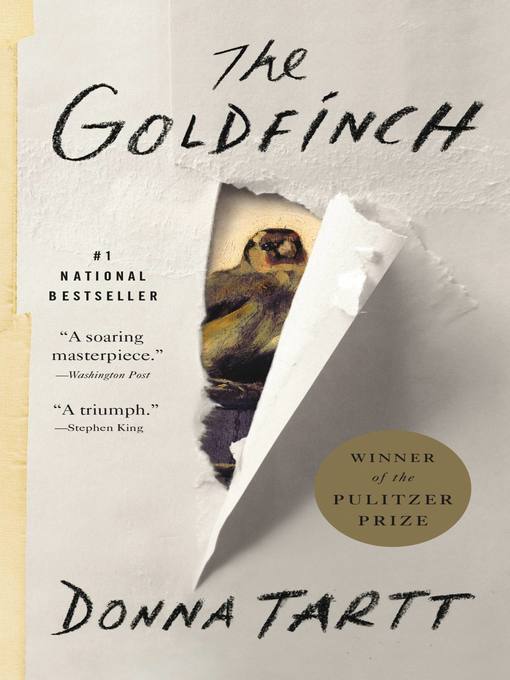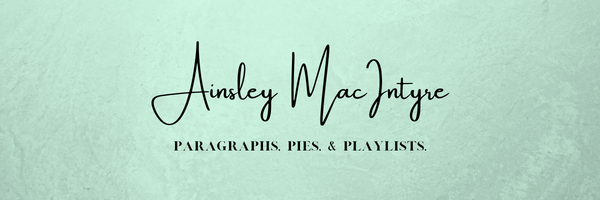
Before and after. Everything is before and after. And the middle is The Goldfinch.
I started reading Donna Tartt’s The Goldfinch the night before my grandfather suffered a major fall that put him in the hospital. I finished it two and a half weeks later, on the morning of his funeral.
Each of the days in between felt slow, suffocating in their sad sameness. I remember them now as a blur of anxious interactions with doctors and nurses, brief bursts of futile optimism and long hours of reading by his hospital bedside. I remember a numbness so deep I suspected it might be permanent. To feel anything at all during that time took intentional prodding. I listened to music too loud. I took showers too hot. And I read The Goldfinch.
I like to think that the right art comes into your life when you need it. This was the book I needed. The Goldfinch is a story about grief and loss and learning how to reconcile the happier, luckier person you used to be with whoever has come out on the other side. The main character, Theo, is a child when his mother is ripped from him in horrific circumstances that further result in a confusion of guilt and trauma. For comparison’s sake, I was well into adulthood when my grandfather slipped away, two weeks shy of his own 99th birthday. I do understand that as far as introductions to grieving go, mine was not so much an experience of being hurled into the pool as it was a gentle wade into the shallow end, however, it is my position that when that pool is made of burning lava, it doesn’t exactly matter how violent or benign your arrival.
But I am maybe not doing the most effective job of selling you on this book by focusing only on its heavy, painful bits. The truth is that The Goldfinch will punch you in the heart, but it will also drop you to your knees in awe and wonder. It is devastating and also wry and also profound, ambitious, imaginative, even absurd in some places. Pick your favorite adjective— this book is that.
You follow Theo on a Dickensian journey from the Upper East Side of New York to staid, suburban Las Vegas to the dark criminal underbelly of Amsterdam. Along the way he meets characters wholly unlike any I’ve ever before encountered in fiction— a WASPy family burdened by mental health demons; a gentle giant with a well-detailed passion for refurbishing antiques; a charming, impulsive father whose interest in his son extends about as far as it benefits his bank account; and above all, Boris. Easily a first ballot entry into my favorite fictional character hall of fame, Boris is a world weary Russian teenager who learned English from an Australian— and the vivid translation of this incredibly specific cadence is maybe Donna Tartt’s most remarkable feat, in a novel brimming with remarkable feats.
This immaculately constructed, immersive universe was a wonderful respite for me throughout an otherwise desolate time. It was comforting to think about anything back then that wasn’t just all of the befores– all the mornings spent with my grandfather over coffee, getting his opinions on whatever was unfolding on the news that day; all the toasts we made to every occasion with a round of rye & gingers; the way he always wore a collared shirt and neatly pressed pants to his doctor’s appointments– and how they were quickly becoming never agains.

Much of The Goldfinch is concerned with the nature of art and our attachment to it. What it means to love something that is in fact immortal– a song or a story. A painting. Theo finds comfort in the novel’s namesake, an oil painting from the Dutch Golden Age that his mother had once admired. Isolated by his own anguish, he begins to see the painting as a point of connection with the larger world.
I don’t know what Donna Tartt’s personal history with grief might be, but I imagine it must be more than passing or abstract, for her to have been able to portray all of its nuances so brilliantly. Reading her insights on life and loss, on existence and despair, right at the moment my own life was calling all of those things into question was a gift so enormous it felt cosmic. I would have enjoyed this book no matter the circumstances in which I read it, but because it came to me when it did I feel shaped by it, connected to it.
A deepened sense of connection is about the only positive thing I’ve found in my personal experience with bereavement, but it might also be the most important thing.
In the hour before my grandfather died, I received a text message from my best friend who had lost her grandmother in the somewhat recent past. She’d sent a variety of encouragement and comfort throughout my grandfather’s hospital ordeal, but in this particular one she described her own grieving process, the specific ways she’d found to feel close to her grandmother and honor her legacy. I don’t know if it was the words themselves or something else, something ancient and universal and powerful, but I was flooded with a sudden and incongruous sense of calm. I watched my grandfather take his final, peaceful breaths and it felt less like an ending and more like some sort of link in a grand and infinite chain.
That moment was three years ago today. In the intervening years, a number of my friends have endured great losses of their own, and I believe that my experience with sorrow has better equipped me to love and support them, as my best friend once did for me. I know well the importance of just showing up for people, of sending messages and flowers and other tokens of care, of listening to their stories, of letting them work through things in their own time.
I credit The Goldfinch with allowing me to make sense of the seething mess of emotions I felt in the process of losing my grandfather, just as I am forever indebted to my friend for sharing her tangible advice for managing grief. In an interview with Anderson Cooper, Stephen Colbert once observed “What do you get from loss? You get awareness of other people’s loss, which allows you to connect with that other person, which allows you to love more deeply.” It was the losses experienced by others that best helped me overcome my own sadness, that enabled me to heal.

My grandfather’s memory still looms large in my life, and in that of my family. He was himself an extraordinary character with a booming Eastern European accent that would be a real accomplishment to translate via type. He loved jokes and German Shepherds, the Weather Network and CNN, restaurants, sweater vests, gardening, making homemade soups and pickles. He always gave me a five dollar bill when I went to the beach by his house “for french fries or ice cream,” even when I was solidly in my twenties, and he made sure to buy “skinny milk” whenever I came in the summer to visit. He considered my grandmother to be the love of his life and was achingly proud of his three children. He was preposterously handsome, with a full head of hair even in his nineties, and extremely aware of that fact. He was the kind of person who lived the kind of life that someone could write a 700 page book about.
Maybe one day I will. Maybe one day I’ll be able to wrangle all the right words and end up with something even a fraction as wondrous and wise as The Goldfinch. If I ever do, I hope that book ends up in the lap of the reader who most needs it, that it carries them through the dazed weeks and months they’ll spend trying to put themselves back together, until they realize that the pieces fit together differently now but the whole is somehow still beautiful.
“…I add my own love to the history of people who have loved beautiful things… passing them along literally from hand to hand, singing out brilliantly from the wreck of time to the next generation of lovers, and the next.” — Donna Tartt, The Goldfinch

A beautiful tribute to a truly loving character, the extent of whom could fill a series of books. I will reread The Goldfinch and think of it through your lens. Congratulations on immortalizing your sweet grandfather.
LikeLike
Thank you so much for the kindest words I could possibly hope for, this means a lot. I feel like I find something new every time I pick up The Goldfinch, enjoy your reread!
LikeLike
“Skinny milk” will forever be my favorite phrase now.
Ainsley, you are such a talented writer. You managed to shine a light on a wonderful man and his life and a book that partly saw you through your grief at the same time in a clear, thoughtful, emotional prose. I laughed and cried, and I did not wat the post to end.
I look forward to the book you’ll write about you grandpa one day ❤
LikeLike
Some dairy farm out there should consider “skinny milk” as part of their branding 😂
Thank you so much for this impossibly generous comment, you summed up everything I hoped to achieve in writing this and I’m so happy you think that it all came together. Your support and encouragement are infinitely appreciated!
LikeLike
Ainsley, what a captivating tribute to dzjadzju . I’m sure there will be a to Vodka toast to him tonight and some heartfelt reminiscence. He was a lovely soul who left you all with
many fond memories. Take pleasure in the beauty he left behind.
Hugs to all the family
Karen
PS. Also nice tribute to Donna Tartt
Get Outlook for iOS
________________________________
LikeLike
Thank you so much for reading and also taking the time to leave this extremely lovely comment! You were absolutely correct that we did indeed toast to his memory, although he might have been disappointed in the moderation we practiced by not finishing the bottle. Hope everyone is well, all the love!
LikeLike